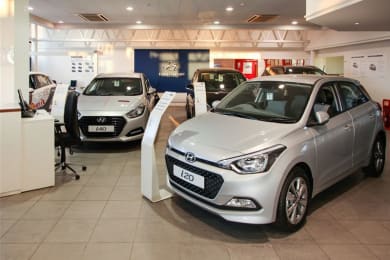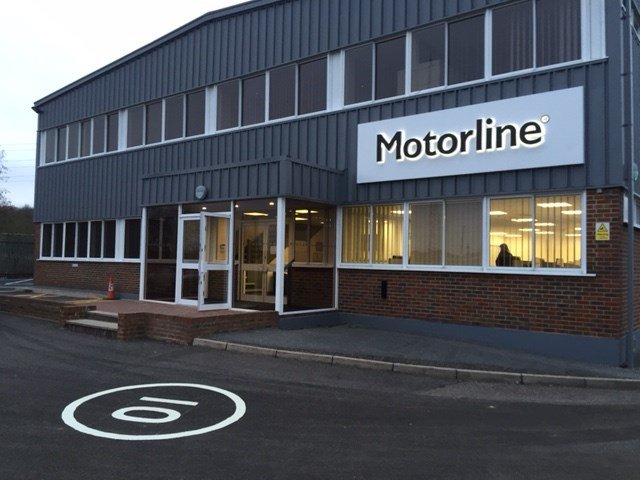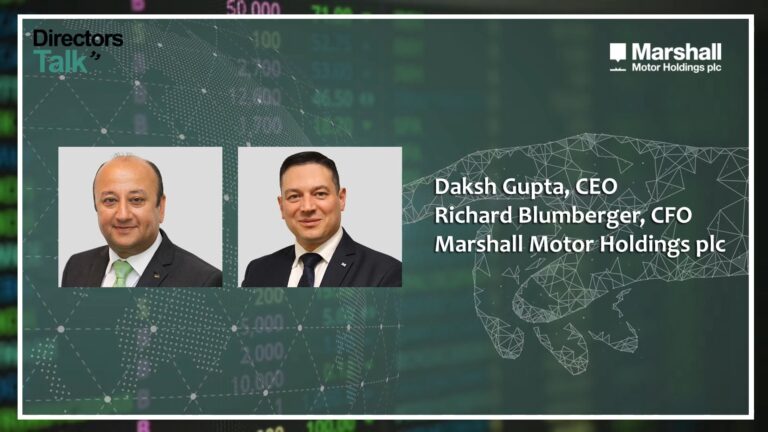Marshall Motor Holdings PLC (LON:MMH) Chief Executive Officer Daksh Gupta and Chief Financial Officer Mark Raban caught up with DirectorsTalk for an exclusive interview to discuss the sales of Marshall Leasing and the benefits of the disposal to the group
Q1: Daksh, why are you selling Marshall Leasing and what does this mean for the group?
A1: Following a strategic review, which considered current market dynamics, ongoing leasing sector consolidation, long-term growth opportunities and investment requirements, the Board concluded that the future of Marshall Leasing was best served under new ownership. It’s worth pointing out that 8 of the top 10 motor leasing businesses are owned by either financial institutions or OEM’s which demonstrates that scale is important in this sector. With this mind, we believe that the Bank of Ireland are a good buyer for our leasing business and are well placed to accelerate its growth profile.
In terms of what it means for Marshall, as a result of this transaction our balance sheet has been further strengthened and as a pure automotive retailer we’re now focussed explicitly on core retail operations.
Q2: Mark, can you talk us through the terms of the deal?
A2: Marshall Leasing, as you know, is a nationally recognised quality business, it’s got a really good team and a strong financial track record, the terms that we’ve managed to achieve really reflect that.
So, two key things to point out, firstly the price, we’ve achieved a price of £42.5 million for the business, that’s a very material sum when you benchmark it to our market cap, that’s about 35% of our market capitalisation. In addition, Bank of Ireland will be assuming all the Marshall Leasing vehicle debt which is £66 million so that comes right off our balance sheet which is great news. The exit multiple was about 11.5 times our profit after tax which we think compares very well.
I’m also particularly pleased that we get to have an ongoing relationship with Marshall Leasing for the supply of new vehicles, it’s an important relationship with us and it’s an important revenue stream for our core retail business.
So, overall, in terms are good, we’re pleased with them and represents good value for all our shareholders.
Q3: What does this do for the balance sheet?
A3: It’s transformational really for our balance sheet, there’s three very material impacts.
First of all, it removes over £100 million of debt from our balance sheet so that leaves Marshall Motor now ungeared with a net cash positive position which is a really good place to be.
Secondly, we recognise quite a large gain on the disposal of this business, around about £40 million which takes our net assets per share, that’s total asset backing, to £2.54 and that’s a big step forward from where we were.
Thirdly, in terms of the balance sheet, it’s good for us in the sense that it removes quite a bit of residual value risk and therefore reduces the risk profile of the business.
So, overall, very positive for the balance sheet and leaving us well positioned for the future.
Q4: Daksh, what are the plans with regards to reinvesting the proceeds?
A4: I think, as Mark said, clearly the immediate position will be using the proceeds to paydown our existing debts which will further strengthen the balance sheet and, as Mark said, on a proforma basis as of 30th June the group is totally debt free with a net asset per share of £2.54. On top of our cash generation, we also have a very strong freehold property portfolio and a committed £120 million RCF which really demonstrates the financial strength of the group, this ultimately leaves us well placed to maximise opportunities as they arise.
Q5: Finally, where do you see the growth opportunities for Marshall Motor Holdings?
A5: I think it’s fair to say we’ve probably been one of the leading consolidators in the sector over the last ten years, we’ve now completed 22 transactions and certainly 2 fairly material transactions since IPO in the last couple of years, namely SG Smith and Ridgeway. Certainly, from our perspective, we believe that we’ve got further opportunity to organically improve some of these businesses that we’ve acquired in recent years.
We also, clearly, have opportunities to explore further acquisitive growth opportunities, we’re obviously operating in effect to that to continuously consolidate, however it’s worth saying that we’ll only do this when it makes strategic and financial sense for our shareholders. In that regard, it’s also worth mentioning that our strategy remains unchanged and that’s very much about growing with our existing brand partners and our ever-extending our geographic footprint wherever possible.
So, hopefully you can get a sense of why we’re very excited about this transaction and what it means for the group going forward.







































